During his opening session at the GL Education Global Assessment Conference held in November, Matthew Savage (www.monalisaeffect.me) set delegates a data triangulation challenge and invited those who offered the best responses to present their solution at a follow up session the following week.
The challenge and response, detailed in Tricia Henderson’s blog below, provides an illustration of the way schools can interrogate the data from the PASS survey to identify and support students’ pastoral needs.
Identifying students' pastoral needs
So, here we are stuck in ‘lockdown’ again and I am not seeing my students in class and checking in on them is a lot harder than usual. The ‘masks’ that Matthew Savage has spoken of are more real than ever. Cameras and mics off, no faces, no voices and really difficult to gauge how students are feeling especially those with SEN who often don’t ask for help or discuss feelings anyway.
I am a learning support teacher and was a link for a specific year 9 student. He often needed prompting and very specific instruction in lessons when in school, so I was not surprised to find his work rate and attitude had taken a knock during lockdown. I had emails from teachers about work incomplete or not done at all and when I tried to help in breakout rooms I heard many sighs and I am sure if the camera had been on I would have seen an eye roll with each one. I had some ideas why but wanted to look at the Pupil Attitudes to Self and School (PASS) data we had in school to help support and focus on what we could do for this student going forward.
So my focus became what might be further exacerbated with learning from home and could the PASS data help support what my ‘gut’ was telling me.
So I started by looking at the domain data:
|
Domain 1 - Self |
· PASS 2 – Perceived Learning Capability · PASS 3 – Learner Self Regard |
|
Domain 2 - Study |
· PASS 4 – Preparedness for Learning · PASS 6 – General Work Ethic · PASS 7 – Confidence in Learning |
|
Domain 3 - School |
· PASS 1 – Feelings about School · PASS 5 – Attitudes to Teachers · PASS 8 – Attitudes to Attendance · PASS 9 – Response to Curriculum |

At first glance this student should be ok he is fine in all three domains but my ‘gut’ still wasn’t happy with that so I dug deeper.

And there it was. My student had a very low result for one part of each domain.
PASS 3 - Self domain
PASS 6 - Study domain
PASS 9 - School domain
Still even though they came from three different domains they had a common thread and provided the question ‘what came first?’
Was it PASS 3, the student's belief in the fact they couldn’t do stuff - ‘the flea jar’ that Matthew Savage had talked about that then made him have a bad PASS 9 - response to learning, because he didn’t see the point and then have what could be perceived as a bad PASS 6 - general work ethic. Or was it that the online lessons were not working for him as he could not be supported and prompted as much as he is in school and this caused his PASS 9 issue and so ‘checked out’ which was the PASS 6 situation that then lead on to PASS 3 - ‘I can’t do this’ feeling?
Well, regardless of ‘what came first?’ I wanted to do something to support him in feeling better about his learning and hopefully increase his self-esteem and confidence in himself and his abilities. This started with finding one place for all of the issues regarding work not done or completed being recorded and luckily my head of department had shared a learning online tracking sheet with us that was perfect for this. I could ask teachers to quickly fill it in to let me know if work was not done and I would deal with it. This saved teachers having to send emails and mum getting several separate emails each day. It also meant that both me and the student’s mum could see what work needed to be done and he could catch up at home or in additional studies lessons in school. I also had two support lessons after school and offered these to the student and his parents and they thought it was a great idea and agreed to come to one of them.
Since doing this presentation at the conference and putting these strategies in place, I have emails and contact in class from the student asking for help and support. He has also attended every after-school support lesson as he agreed to without being chased or forced. In a lesson early on he asked for access to his tracker so that in his words ‘I can work on what I need to do and not bother my mum’ and he comes to the support lessons having checked the tracker and telling me what he has to work on and asking for help if he needs it. I have had a meeting with his mum and talked about things at home and ways we can support with that. I have had further discussions with the student and talked about organisation and helping at home and we worked together and created a to-do list all negotiated with the student and me and shared with his mum after so he has ownership and feels connected to this, looking forward to seeing how this goes.
So, although this is still a work in progress, I feel that all this student needed was someone to believe in him and give him the chance to show how responsible he can be. He seems happier and more engaged in lessons even online and seems to be more empowered as he feels he has a say in what is going on. I will definitely remember this for the future and will make sure he feels part of the process when we go back to school. My ‘gut’ told me something but it was good to have the data to back it up and support me in helping this young man take care of himself and his learning.


